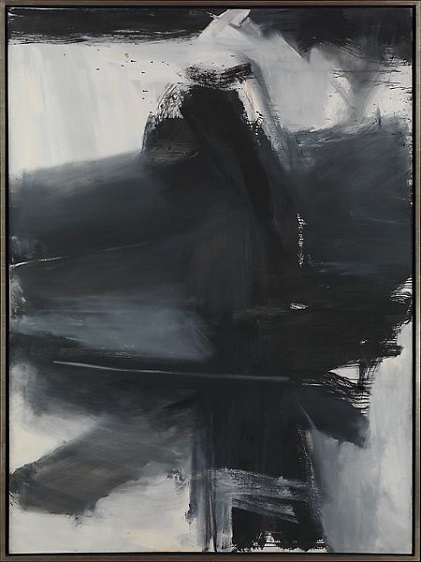Baackwateraa illa!
The concrete soffit of the bridge
screeches over the dome
of the No. 4 kettuvallam
like a cormorant denied shallows.
The boat barely makes it
under the Venattukaddu Bridge
connecting the Manimala to the canal.
The Vembanad is a drop of mercury
on a glass pane, wobblytumescentgray
seeking fission from the nimbostratus
bulging uncertainly over it. I realize
I have stretched the metaphor but,
for Verghese, captain of the houseboat
it does not go far enough:
The lake’s surface is new, upraised—
a mezzanine on dodgy supports
rising over unpunctuated horizon.
Gestalts of land/water no longer apply.
Monochrome makes even GPS unreliable.
I abandon it; place my trust entirely
on Verghese’s hand memory.
He does so too. His eyes useless
to differentiate grey from gray.
Crows make pitstops on the bow.
There are no other perches on offer.
The boatman waves them off,
reluctantly. Bramhinis vie with kingfishers
for measly pickings. Familiar fishing pools
are obscured, the currents too fast
for victuals to remain in one place.
I ask Verghese about home.
He looks at me, our eyes meet
then he turns back to his wheel.
‘Baackwaateraa illa! Only waater…’
his voice fades but he stays
on the straight and narrow,
port and starboard equidistant
between drowned paddy fields.
Hamam Soap
The municipal tap burbles
like a didgeridoo
for a full half hour,
before showing the slightest
signs of incontinence.
Cued to rattling pipes,
the building shakes itself awake;
all rise as one, reach for buckets.
Taps are tapped, vigils formed.
With each drip,hearts flutter.
Righteousness is played out
in a synesthesia of lather and foam,
of head baths and bowel movements.
In passages, toranas of towels align,
fresh with familiar green exhalations
deep from within the armpit
of Manilal Mansion.
The last pair of Kolhapuri chappals in the known universe
On the turning of Dimtimkar Street into Temkar Mohalla, a mobile repair store flourishes. Every new customer, while praising the proprietor’s acumen, remarks on an odour almost sublimated, passed off almost, as a whiff of imagination. For forty-seven years, Mhamdu chopped meat with the finesse of a mobile repairman on a trunk of seesham inherited from his father, along with meat cleavers and a sharpening strop. For forty-seven years the trunk, steadfast like granite, stood right there in the shop where sim-cards are now arrayed. Mhamdu sits on the stoop across the street, finding in the eyes of every punter a former customer of trotters, kidneys or testicles. Once in a while he plays contrapuntal tunes in his head, chopchopchop a-chopchop, backbeats he once composed while reducing muscle to mince. Twice a day, every day, he tweaks his skullcap, puts down his lungi for modesty and airs a grilled vest as he enters Iqbal Restaurant (Pride of Nagpada). He is granted moong daal and rice, a largesse that bleeds him internally, as he swirls scraps of gourd in his bowl. The owner of the Iqbal eyes him cursorily, satisfied Mhamdu still walks on something promised to him for the two square meals. The sole may have worn down but the leatherwork remains burnish’d. Angtha and karangali are wound into exquisite veins, like the braided knee-length tresses of Tamil heroines in old Hindi films. The kapshi patta across the foot is adorned with a die-punched floret, topped off with a fluffy gonda, red as a cherry on black forest cake. Each stitch identifies the mochi who made it. Mhamdu is aware he is being inspected as he rises to wash his hands. Under the tap, he opens out his gnarled palms; digits rise like crags in the Deccan Traps, metamorphic remnants of the furnace of eruption, denuded of all vegetation. In contrast, the soles of his feet are as soft as a healthy liver, protected port and starboard by side flaps of leather. He turns his back on the longing gaze and walks to resume his vigil on the stoop. Mid-street, he is accosted by a posse of cattle on whom no one has the gotis to claim ownership. Like a believer, he touches the rump of the one nearest, his fingers meet bone instead of loin. It sears his soul to let them scavenge detritus on Dimtimkar Street, chewing plastic instead of cud. As the malnourished horde moves on, he recites a fatiha under his breath. He no longer visits the Sangetras Mosque on Hujara Street, not a hundred feet away. His promise has made him a heathen. He can never leave his footwear outside a place of worship, an agreement is an agreement. Owner of the last pair of Kolhapuri chappals in the known universe, Mhamdu has set down his twinkling knives, conceding defeat to a vegetarian city. He burnt this bridge himself, handing over keys and location to a boy whose skills lie in shuffling printed circuits. In the years he has left, he looks back at the times he made it out (between his chopchopchop a-chopchop) alive, in 1969, in 1984, in 1992 and again in 1993, using his bulk and his blades to intimidate his way out of conflict, flying rather than fighting, letting his trusty Kolhapuris snatch him out of harm’s way even as, successively in 1969, 1984, 1992 and 1993, they burnt his shop down. For nearly a year after, every passer-by salivated unselfconsciously, assailed by the almost sublimated, almost imaginary whiff of burnt meat.

